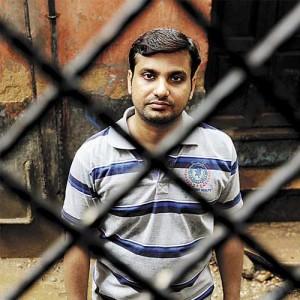Ratio of Muslims in Different Jails of the Country is Far Higher than Their Population
By Afroz Alam Sahil
Old Delhi resident Mohammad Amir Khan wanted to become a pilot and soar high in his career but his dream flight crashed landed him before he could take off. Having languished 14 years in prisons he is now a broken man. Amir cannot forget the evening when he had just stepped out of his home to buy medicines for his ailing mother when the police arrested him. At that time Amir was 18.

After being arrested, Amir who was born and bred in India was declared a Pakistani by the police in the media reports. Later serious charges like that of bomb blasts, terrorism and anti-state activities were laid against him. At the age of 18 years he was then embroiled in 19 court cases.
Even before entering into the practical world, Amir was fighting legal battles. Starting in 1998 this legal battle lasted until February 2012 when he was declared innocent by the court. He was exonerated of all the charges levelled against him.
Amir did not only spend 14 years of his early life in jail but had also buried all his dreams there. When he came out of the jail his father had already died. His grief stricken mother is unable to speak and has lost her voice for ever. Having borne and undergone such a horrific experience Amir’s faith in the judicial system remains unshaken.

Amir says, ‘Having been declared innocent by the court, who will now compensate me for the most precious days of my life wasted in jail?’ He is now trying to start his life afresh. In this regard he has met several of the political leaders and even president [of India] but except assurances he has not received anything else from anywhere.
Minority prisoners in jails
This is not a story of Amir alone. There are many youths like Amir who, after spending several years in jails, have been exonerated by the courts. According to the figures of National Crime Record Bureau of all the prisoners incarcerated in jails in the country 28.5% are from the minority community which in fact forms only 20% of country’s population.

As for prisoners from religious minorities until December 2013, the percentage of Muslims was 19.7 while according to 2001 census reports the percentage of population of Muslims is 13.43.
The percentage of Sikh prisoners is 4.5 while their percentage in the country’s population is only 1.87.
Christian prisoners are 4.3 %; their population is 2.34 percent.
These figures show that the percentage of those against whom charges have been proved is: Muslims 5.6%, Sikhs 1.2% and Christians 1.2%. Cases against rest of 14% Muslims, 2.8% Sikhs and 3% of Christian prisoners are under trial.
Khalid Mujahid’s case is a testimony
The convenor of Rihai Manch, an organisation fighting for the release of innocent detainees, and Lucknow based advocate Shoeb has been overseeing six different cases in respective courts in Uttar Pradesh where at least one dozen of youths have been languishing. All of these cases are related to terrorism. According to him in two of the cases he has been fighting, ‘Four of the accused were honourably released but seven important years of their lives have been spent in jails.’
Shoeb adds that he himself is looking after the cases against Khalid Mujahid and Hakeem Tariq. ‘In this regard Uttar Pradesh Government formed the Nimesh Commission. The Commission held both of the detainees innocent. It should be remembered that Khalid Mujahid died during police custody. Causes of his death are unclear. However Hakeem Tariq is still being held under another case.’
Human Rights Activist and the author of recently published book Kafka Land Manisha Sethi says, ‘Criminal justice system of the country works against the poor and [religious] minorities. Police and intelligence agencies are not unbiased either. You will find that Muslim prisoners spend up to 20 years in jails after which courts exonerate them. All of us need to think over it.’
Akhlaq Ahmad of Association for Democratic of Civil Rights thinks, ‘It is only the prisons where Muslims are more than their total percentage in population of the country. In addition to being corrupt, administration is highly communalised as well.’
Akhlaq Ahmad supports his argument by making a special mention of the 2012 Supreme Court case in which two-member-bench led by Justice H. L. Datave and Justice C.K. Prasad, had released 11 accused in one of the 1994 Terrorism cases of Ahamadabad in Gujarat saying that the law did not permit anybody’s harassed on the basis of his religion.
Plight of Muslim Prisoners
Statistics of Muslim prisoners show that even in the states where Muslims constitute sizeable number their number in jails is higher as well. Thus in the jails of Uttar Pradesh the number of Muslims is the largest. By the end of 2013 there were 20,000 Muslims in the jails of Uttar Pradesh. Second to Uttar Pradesh was West Bengal where there are about 10,000 Muslims in jails.
65% of prisoners from SC, ST and OBC
National Crime Record Bureau’s statistics reveal that 65% of all the prisoners in jails belong to Schedule Caste, Schedule Tribe and OBC (other backward classes). Of these are: SC 21.7%, ST 11.5% and OBC 31.6%.
Human Rights Activist Humanshu Kumar says that these castes are poor and backward. Most of the governments do not provide social and economic justice to them. They are the victims of most of the injustice. And those who are fighting for their rights are in jails.
The author of a recently published book Colours of Cage Arun Farera also opines that the police exploits those who are already the exploited sections and the ones who are big remain big [get special treatment] in jails as well.
Tihar Jail’s Welfare Officer Charan Singh cites reasons of the ever increasing number of Muslims and Dalits in jails including illiteracy, poverty, unemployment, large families, superstitions, inequality in the society and race to go ahead of the other. Bias in the implementation of law is also a big reason of this.
Translated from daily Inquilab, 12 December 2014, by Urdu Media Monitor.Com
Related articles
Khalid Mujahid’s death and criminal silence of Muslim leaders
Many Muslim youth are in the custody of investigative agencies
The issue of the release of innocent Muslim youths in Uttar Pradesh
